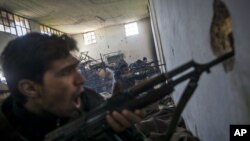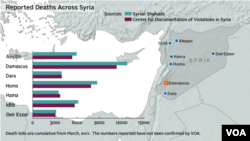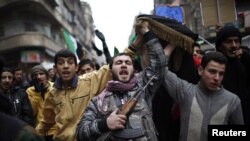The United Nations is highlighting the civilian toll in the nearly two-year conflict in Syria, saying thousands have died in a crisis that has become increasingly sectarian in nature.
U.N. human rights investigators say in a new report Thursday that the fighting "has brought immeasurable destruction and human suffering" to Syrian civilians, and that the humanitarian situation has rapidly deteriorated since late September.
The report says human rights abuses continue unabated.
It notes dramatic increases in violence in major cities, particularly Damascus and Aleppo, as well as a rise in attacks on cultural sites.
The investigators say fighting between government forces and rebels seeking to oust President Bashar al-Assad has become "overtly sectarian." The major divide is between Syria's Sunni majority, which broadly backs the rebels, and the minority Alawite community supporting Assad's government.
The report says the sectarian divide has provided motivation for foreigners to join the fighting. It says Sunnis from the Middle East and North Africa are siding with the rebels, while Shi'ites, including Lebanese Hezbollah militants, are helping the government.
Paulo Pinheiro, who chairs the U.N. Commission of Inquiry on Syria, said the fighting has also drawn in other Syrian minority groups.
"Some minority communities, including Christians, Kurds and Turkmen, have also been caught up in the conflict, and this is new, this is a new development of the last month, and in some cases forced to take up arms for their own defense or taking sides in the conflict," said Pinheiro.
The report notes that opposition fighters control large areas in northern and central Syria, but remain poorly organized in the country's south where government forces remain in control.
It says the Syrian military has shifted its tactics, using fewer ground assaults and more shelling in rebel-controlled areas. The government is also besieging those strongholds and strengthening border areas with Jordan and Lebanon to try to slow the flow of weapons and people.
The investigators say opposition fighters have increasingly been able to obtain weapons, from small arms up to anti-aircraft missiles, with many taken from military camps, but others being smuggled into Syria from abroad.
Pinheiro says the investigators reiterate that a negotiated political settlement is the only way to bring an end to the conflict.
"This is war where no military victory is possible. I think that is a great illusion, that providing arms for one side or the others, the end of the crisis will be very near to us," he said.
Also Thursday, Russian President Vladimir Putin said Moscow is not focused on the fate of Mr. Assad's government, but rather with finding a solution that prevents the breakup of Syria.
U.N. human rights investigators say in a new report Thursday that the fighting "has brought immeasurable destruction and human suffering" to Syrian civilians, and that the humanitarian situation has rapidly deteriorated since late September.
The report says human rights abuses continue unabated.
It notes dramatic increases in violence in major cities, particularly Damascus and Aleppo, as well as a rise in attacks on cultural sites.
Syria's Religious, Ethnic Groups
Syria's Population: 22.5 million people
(CIA World Factbook July 2012 estimate)
Syria's Ethnic Groups
Arab: 90 percent
Kurds: 9-10 percent
Armenians: 1 percent
Turkomans: 0.2 percent
Circassians: Less than 0.1 percent
Syria's Religious Groups
Sunni Islam: 74 percent
Christians: 10-11percent
Alawite Islam: 9-10 percent
Druze: 3 percent
Ismaili Islam: 1percent
Ithna'ashari/Twelver Shi'ite Islam: Less than 1percent
The report says the sectarian divide has provided motivation for foreigners to join the fighting. It says Sunnis from the Middle East and North Africa are siding with the rebels, while Shi'ites, including Lebanese Hezbollah militants, are helping the government.
Paulo Pinheiro, who chairs the U.N. Commission of Inquiry on Syria, said the fighting has also drawn in other Syrian minority groups.
"Some minority communities, including Christians, Kurds and Turkmen, have also been caught up in the conflict, and this is new, this is a new development of the last month, and in some cases forced to take up arms for their own defense or taking sides in the conflict," said Pinheiro.
The report notes that opposition fighters control large areas in northern and central Syria, but remain poorly organized in the country's south where government forces remain in control.
It says the Syrian military has shifted its tactics, using fewer ground assaults and more shelling in rebel-controlled areas. The government is also besieging those strongholds and strengthening border areas with Jordan and Lebanon to try to slow the flow of weapons and people.
The investigators say opposition fighters have increasingly been able to obtain weapons, from small arms up to anti-aircraft missiles, with many taken from military camps, but others being smuggled into Syria from abroad.
Pinheiro says the investigators reiterate that a negotiated political settlement is the only way to bring an end to the conflict.
"This is war where no military victory is possible. I think that is a great illusion, that providing arms for one side or the others, the end of the crisis will be very near to us," he said.
Also Thursday, Russian President Vladimir Putin said Moscow is not focused on the fate of Mr. Assad's government, but rather with finding a solution that prevents the breakup of Syria.







